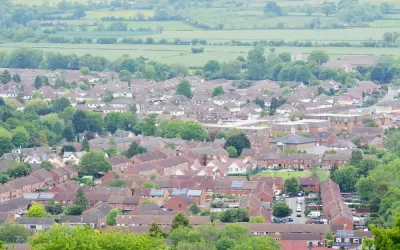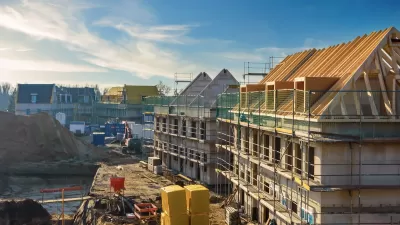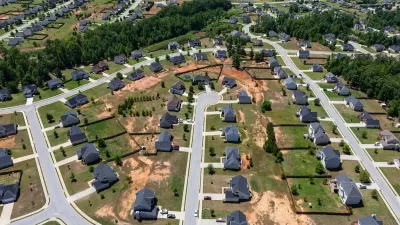The green belts that hem in developed areas in Great Britain are set arbitrarily, according to this op-ed in The Guardian, and the boundaries have outlived their usefulness.

John Elledge argues that it's time to rethink the urban growth boundaries, or greenbelts, of U.K. land use and growth policy. Elledge begins the argument by noting the lost opportunities that the policy has embedded into the country.
The creation of the metropolitan green belt fixed the boundaries of London as wherever the suburbs happened to stop. So Goodwood Avenue stops midway at an unconvincing simulacrum of countryside that’s hemmed in by homes on three sides. There are two tube stations within a mile, yet despite the housing shortage, there’s no building on this land. Not because it’s unsuitable; simply because nobody’s ever built there.
Despite the compelling case made for greenbelts at one point in development and land use planning history (a case made capably and sympathetically in this op-ed), Elledge argues that it's time to rethink growth strategy around the country, because a lack of space is a leading cause of the nation's housing crisis.
Elledge acknowledges that neither the nation's prominent politicians, nor residents of the suburbs, support proposals to loosen their green belts. But in the meantime, "[t]hey are selling younger people down the river." But "gradually, the group that benefits from the green belt is shrinking, and the group it blights is growing. Younger people vote now, too."
FULL STORY: Loosen Britain’s green belt. It is stunting our young people

Maui's Vacation Rental Debate Turns Ugly
Verbal attacks, misinformation campaigns and fistfights plague a high-stakes debate to convert thousands of vacation rentals into long-term housing.

Planetizen Federal Action Tracker
A weekly monitor of how Trump’s orders and actions are impacting planners and planning in America.

San Francisco Suspends Traffic Calming Amidst Record Deaths
Citing “a challenging fiscal landscape,” the city will cease the program on the heels of 42 traffic deaths, including 24 pedestrians.

Defunct Pittsburgh Power Plant to Become Residential Tower
A decommissioned steam heat plant will be redeveloped into almost 100 affordable housing units.

Trump Prompts Restructuring of Transportation Research Board in “Unprecedented Overreach”
The TRB has eliminated more than half of its committees including those focused on climate, equity, and cities.

Amtrak Rolls Out New Orleans to Alabama “Mardi Gras” Train
The new service will operate morning and evening departures between Mobile and New Orleans.
Urban Design for Planners 1: Software Tools
This six-course series explores essential urban design concepts using open source software and equips planners with the tools they need to participate fully in the urban design process.
Planning for Universal Design
Learn the tools for implementing Universal Design in planning regulations.
Heyer Gruel & Associates PA
JM Goldson LLC
Custer County Colorado
City of Camden Redevelopment Agency
City of Astoria
Transportation Research & Education Center (TREC) at Portland State University
Jefferson Parish Government
Camden Redevelopment Agency
City of Claremont





























